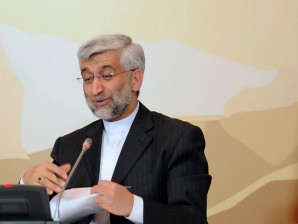World powers, Iran ‘far apart’ in nuclear stalemate

Iran’s Supreme National Security Council Secretary and chief nuclear negotiator Saeed Jalili. AFP FILE PHOTO
ALMATY, Kazakhstan—Iran and world powers have failed to break the deadlock in the crisis over Tehran’s nuclear drive, with the EU’s top diplomat and chief negotiator saying the positions were still “far apart”.
After two days of exhausting diplomacy in the Kazakh city of Almaty, no new date was agreed for the resumption of talks searching for an elusive breakthrough after more than a decade of tensions.
“It is fair to say that Iran is willing to take very limited steps on its nuclear programme while expecting very significant results in return,” a senior US official told reporters on condition of anonymity on Saturday.
“They put forward some minimal ideas but expected a great return and a quite disproportionate return.”
Iran’s chief nuclear negotiator Saeed Jalili praised the talks as “comprehensive” but indicated that Tehran wanted to see more put on the table by the world powers to “gain the confidence” of the Iranian people.
Article continues after this advertisementThe world powers— comprised of the five permanent UN Security Council members and Germany and known collectively as the P5+1—had offered some easing of the sanctions that have hurt Iran’s economy in the past two years in return for Tehran accepting limits on its nuclear programme.
Article continues after this advertisementBut speaking after the talks wrapped up, EU foreign policy chief Catherine Ashton, chief negotiator for the P5+1, admitted that they were still waiting to see “real engagement” from Iran over their proposal.
“It became clear that the positions (of the world powers) and Iran remain far apart on the substance,” Ashton told reporters.
Britain, as one of the participants in the talks, called Iran’s position “far short” of what was needed.
“Lengthy discussions took place on some issues, but a wide gap remains between the parties. Iran’s current position falls far short of what is needed to achieve a diplomatic breakthrough,” Foreign Secretary William Hague said in a statement.
Unlike at the previous round of talks in Almaty in February which ended more cordially, the two sides did not agree a time and a place to hold the next meeting.
Instead, Ashton said the sides had decided to go back to their capitals to discuss what to do next and promised that she would be in touch with Jalili.
Substance not there yet
The US official said Ashton would be calling Jalili within a matter of days, adding that the talks were much more substantive than they had been in the past.
“It was really a lot of give and take — quite different from the last times. But you still have to get to the substance. The substance is not there yet,” the US official said.
Jalili offered little hope of Iran proposing concessions on the main sticking point in the talks — Tehran’s insistence on its right to enrich uranium on its soil.
“Now they (the world powers) must work to gain the confidence of the Iranian people,” said Jalili, a hardline conservative close to Iran’s supreme leader Ayatollah Ali Khamenei.
“We believe that the right to enrich is an inalienable right of the Iranian people — whether we are talking about (to a level of) five percent or 20 percent,” Jalili said.
The clock is running down on diplomacy to solve the crisis, with Iran’s archfoe Israel refusing to rule out air strikes against Iran to halt its nuclear drive.
Israel’s reaction to the latest round of talks was to call for a “firmer stand” with Iran.
“It is time for the world to take a firmer stand and tell the Iranians in no uncertain terms that the masquerade of negotiations is about to end,” Israel’s Strategic Affairs and Intelligence Minister Yuval Steinitz said Saturday.
“Israel has already warned that the Iranians are using the rounds of negotiations to win time to advance their uranium enrichment to the stage of acquiring a nuclear weapon,” he said.
However few analysts had expected an instant breakthrough in these talks, especially with Iran’s presidential elections looming in June and President Mahmoud Ahmadinejad stepping down after serving the maximum two terms.
Iran insists on international recognition of what it says is its “right” to enrich uranium, a key component of the nuclear fuel cycle which can also be used to make the explosive core of an atomic bomb.
But the world powers say Tehran must end enrichment to high levels and verifiably suspend operations at the Fordo mountain bunker where such activity takes place before recognising Iran’s rights to less threatening nuclear activities.
Iran denies it is developing the atomic bomb and argues that it requires a nuclear programme solely for peaceful medical and energy needs.